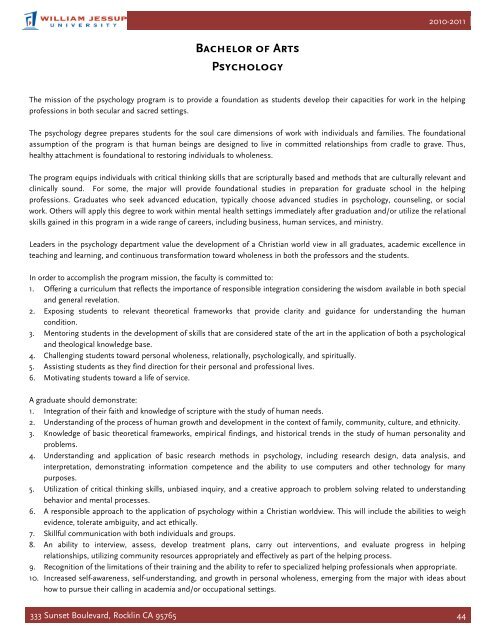School of Professional Studies - William Jessup University
School of Professional Studies - William Jessup University
School of Professional Studies - William Jessup University
Create successful ePaper yourself
Turn your PDF publications into a flip-book with our unique Google optimized e-Paper software.
Bachelor <strong>of</strong> Arts<br />
Psychology<br />
2010-2011<br />
The mission <strong>of</strong> the psychology program is to provide a foundation as students develop their capacities for work in the helping<br />
pr<strong>of</strong>essions in both secular and sacred settings.<br />
The psychology degree prepares students for the soul care dimensions <strong>of</strong> work with individuals and families. The foundational<br />
assumption <strong>of</strong> the program is that human beings are designed to live in committed relationships from cradle to grave. Thus,<br />
healthy attachment is foundational to restoring individuals to wholeness.<br />
The program equips individuals with critical thinking skills that are scripturally based and methods that are culturally relevant and<br />
clinically sound. For some, the major will provide foundational studies in preparation for graduate school in the helping<br />
pr<strong>of</strong>essions. Graduates who seek advanced education, typically choose advanced studies in psychology, counseling, or social<br />
work. Others will apply this degree to work within mental health settings immediately after graduation and/or utilize the relational<br />
skills gained in this program in a wide range <strong>of</strong> careers, including business, human services, and ministry.<br />
Leaders in the psychology department value the development <strong>of</strong> a Christian world view in all graduates, academic excellence in<br />
teaching and learning, and continuous transformation toward wholeness in both the pr<strong>of</strong>essors and the students.<br />
In order to accomplish the program mission, the faculty is committed to:<br />
1. Offering a curriculum that reflects the importance <strong>of</strong> responsible integration considering the wisdom available in both special<br />
and general revelation.<br />
2. Exposing students to relevant theoretical frameworks that provide clarity and guidance for understanding the human<br />
condition.<br />
3. Mentoring students in the development <strong>of</strong> skills that are considered state <strong>of</strong> the art in the application <strong>of</strong> both a psychological<br />
and theological knowledge base.<br />
4. Challenging students toward personal wholeness, relationally, psychologically, and spiritually.<br />
5. Assisting students as they find direction for their personal and pr<strong>of</strong>essional lives.<br />
6. Motivating students toward a life <strong>of</strong> service.<br />
A graduate should demonstrate:<br />
1. Integration <strong>of</strong> their faith and knowledge <strong>of</strong> scripture with the study <strong>of</strong> human needs.<br />
2. Understanding <strong>of</strong> the process <strong>of</strong> human growth and development in the context <strong>of</strong> family, community, culture, and ethnicity.<br />
3. Knowledge <strong>of</strong> basic theoretical frameworks, empirical findings, and historical trends in the study <strong>of</strong> human personality and<br />
problems.<br />
4. Understanding and application <strong>of</strong> basic research methods in psychology, including research design, data analysis, and<br />
interpretation, demonstrating information competence and the ability to use computers and other technology for many<br />
purposes.<br />
5. Utilization <strong>of</strong> critical thinking skills, unbiased inquiry, and a creative approach to problem solving related to understanding<br />
behavior and mental processes.<br />
6. A responsible approach to the application <strong>of</strong> psychology within a Christian worldview. This will include the abilities to weigh<br />
evidence, tolerate ambiguity, and act ethically.<br />
7. Skillful communication with both individuals and groups.<br />
8. An ability to interview, assess, develop treatment plans, carry out interventions, and evaluate progress in helping<br />
relationships, utilizing community resources appropriately and effectively as part <strong>of</strong> the helping process.<br />
9. Recognition <strong>of</strong> the limitations <strong>of</strong> their training and the ability to refer to specialized helping pr<strong>of</strong>essionals when appropriate.<br />
10. Increased self-awareness, self-understanding, and growth in personal wholeness, emerging from the major with ideas about<br />
how to pursue their calling in academia and/or occupational settings.<br />
333 Sunset Boulevard, Rocklin CA 95765 44


